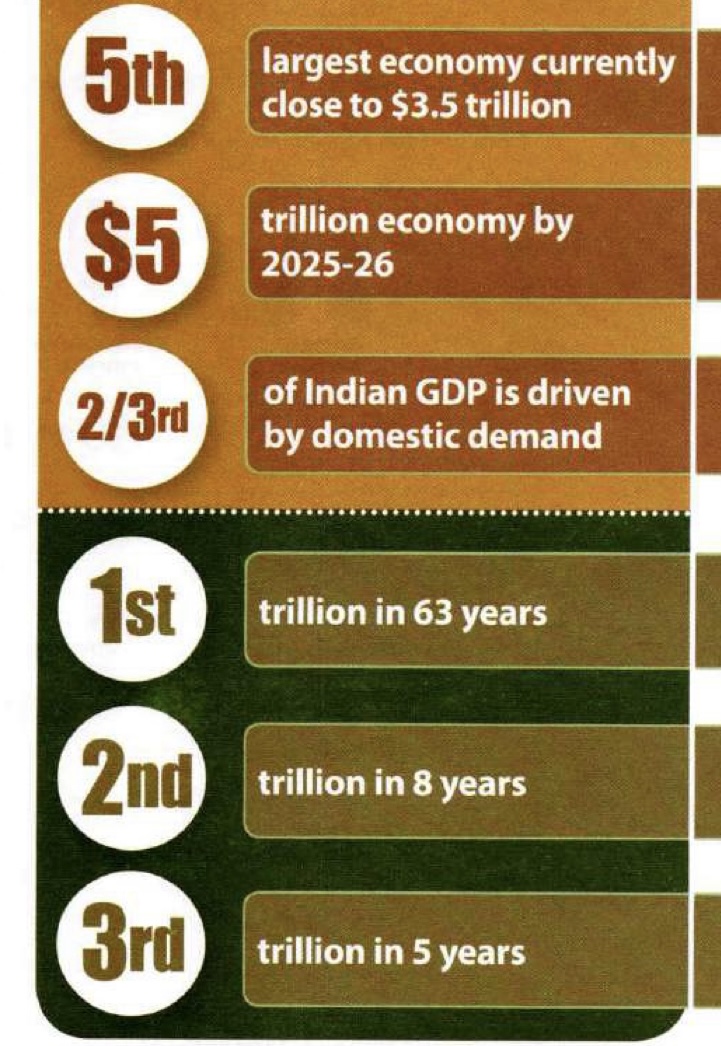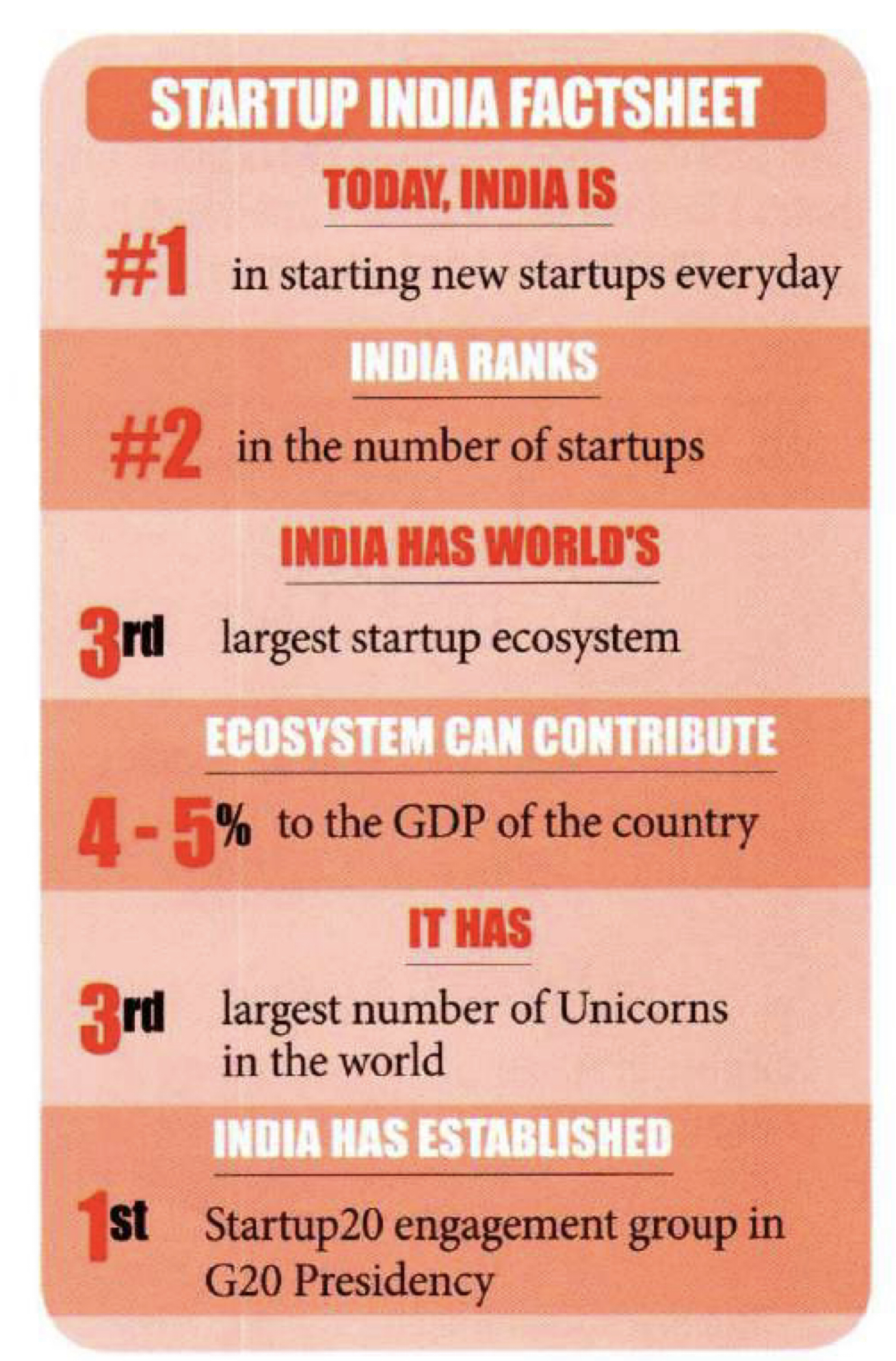ForumIAS announcing GS Foundation Program for UPSC CSE 2025-26 from 19 April. Click Here for more information.
Contents
- 1 Introduction
- 2 Why does New India need to provide opportunities for youth in Startup Ecosystem?
- 3 What are the steps taken by the government to enhance the opportunities for Youth in Startup Ecosystem?
- 4 How does the Knowledge-Based Digital Economy provide opportunities for youth in the startup ecosystem?
- 5 How do sectors of defence and space provide opportunities for Youth in Startup Ecosystem?
- 6 Conclusion
| For 7PM Editorial Archives click HERE → |
Introduction
India is celebrating its 75th anniversary as the world’s youngest and largest democracy. The Prime Minister has set a goal of making India a developed nation by 2047, and the next 25 years have been dubbed “Amrit Kaal.” This period will usher in the Swarnim Yug, which would see India become a developed nation by 2047. Providing opportunities for Youth will be crucial in accomplishing this goal. The government is enacting several programmes to fully realise their potential. With a billion Indians under the age of 35, India’s demographic dividend is set to provide the country with a bright future.
Why does New India need to provide opportunities for youth in Startup Ecosystem?

Startups Catering to Market Demands: The Indian domestic market and demand is projected to reach an enormous $384 trillion by 2047. India’s villages currently house 11% of the world’s population, but around 30 people are moving from villages to cities every minute. By 2047, 20% of the world’s middle class will be in India, creating a new urban population that will require various services such as housing, infrastructure, education, health, and entertainment. Young entrepreneurs have a vast range of sectors to innovate in and meet the growing demand, offering tremendous opportunities for startups to disrupt the market positively.
India’s Rapid Digitisation: India is at the forefront of digitisation, with 41 percent of the world’s real-time transactions occurring in the country. The IT industry in India is booming, with a YoY growth of 15.5 percent in FY22 and revenue surpassing USD 200 billion. Startups have the opportunity to leverage the development in tech sub-sectors like Al, blockchain, XaaS, cloud computing, and more. The Government of India is committed to promoting homegrown businesses and supporting Indian innovators in emerging as global leaders in futuristic technology.
Record FDI and Inclusive Growth: Out of the $950 billion in FDI received since independence, $532 billion came in the last 8 years from 162 countries in 61 sectors across 31 states and UTs. The Digital India initiative has helped drive the growth of the startup ecosystem, especially in remote parts of the nation. The ‘MARG’ portal is providing crucial opportunities and funding for innovators and startups in remote areas, highlighting inclusive development in New India. The new engine of the Indian growth story lies in semi-urban and rural India.
India-Knowledge and content hub of the world: Along with sports, our yoga-spirituality, music cinema, and philosophy-literature, etc., also have the power to establish Indian hegemony in the whole world. Today, India’s Yoga Day and International Millets Day are the most popular among the programmes celebrated by the United Nations. So, India must develop ways of fully leveraging the potential of Indian soft power through startups also.
Opportunities in energy sector: India holds the fourth position in the world, in the field of solar energy. The recently-discovered lithium deposits in Jammu and Kashmir are also likely to open up new opportunities. The energy sector promises guaranteed success and must be leveraged by the youth and startups so that India can become self-sufficient and a net exporter nation of energy by 2047.
What are the steps taken by the government to enhance the opportunities for Youth in Startup Ecosystem?

Startup India acts as a Catalyst for India’s Youth: Startup India has been a decisive and phenomenal intervention by the Government of India to make India’s youth the best in the world. Launched in 2016, it has become a globally known journey of India’s fast-paced, always innovating and resilient entrepreneurial ecosystem.
Through Startup India, the youth have been given access to new opportunities and empowered to drive India’s sustainable economic growth and create large-scale employment opportunities. This has transformed India into a New India where good economics is driving much-needed change.
Working towards digitizing: The Union Budget 2023-24 aims to transform India into a scientific and digitized economy. The government is working towards digitizing all government processes to make them more citizen-centric.
Green Hydrogen Mission: There is a provision of Rs. 35,000 crores for the energy transition in this budget. Rs. 20,000 crore have been given for the Green Hydrogen Mission. Agricultural startups: The Agricultural Budget which was less than Rs. 25,000 crores in 2014 has been increased to more than Rs. 1,25,000 crore today.
India is home to more than 3000 agri-startups today compared to almost nothing 9 years ago. The introduction of accelerator funds for agri-tech startups is not only creating digital infrastructure but also preparing funding avenues. Shree Anna is being promoted for the benefit of our small farmers as well as to increase the growth possibilities of startups in this sector.
Lowering the cost of logistics to increase competitiveness: The National Logistics Policy (NLP), launched in September 2022, aims to lower the cost of logistics and increase the competitiveness of Indian products. The policy targets reducing the cost of logistics from the existing range of 13%-14% to levels on par with other developed countries.
Combining Policies: The NLP’s transformational capacities are further increased when combined with previous connectivity and infrastructure improvement schemes like Gati Shakti, Sagarmala, and Bharatmala. This synergy will further increase the efficiency efforts across all sectors of the economy and encourage value addition and enterprise.
How does the Knowledge-Based Digital Economy provide opportunities for youth in the startup ecosystem?
Building a knowledge-based digital economy: A Digital Public Infrastructure will be developed for the benefit of farmers, while ICMR labs will be made available to private medical colleges and R&D companies for health-based research. Additionally, a Centre of Excellence will be set up to promote research and innovation in pharmaceuticals. District Institutes of Education and Training Centres will also be established to revolutionize teacher training, and a National Digital Library will be built.
Focus on skill development and training: The Pradhan Mantri Kaushal Vikas Yojana will provide training in artificial intelligence, coding, 3D printing, and the Internet of Things. The government will open 30 Skill India international centers, three Centers of Excellence for Artificial Intelligence, and 100 labs for the development of 5G applications. Moreover, stipends will be given to 47 lakh youth to ensure equal opportunities for everyone.
Introducing the National Data Governance Policy: To facilitate the use of data arising from digitization, the government will soon introduce the National Data Governance Policy. This policy will make India’s data available to the country’s youth to develop new technologies and innovations.
How do sectors of defence and space provide opportunities for Youth in Startup Ecosystem?
India’s Defence Exports: India’s defence exports have been growing steadily over the past few years, with the goal of raising them from $1.5 billion to $5 billion by 2024-25.
Innovations for Defence Excellence (iDEX) Framework: To promote innovation and technological growth in the defence and aerospace sectors, the government established the Innovations for Defence Excellence (iDEX) framework. This framework integrates industries such as MSMEs, startups, and individual innovators, as well as R&D institutes and academia, to promote self-sufficiency.
Defence India Startup Challenge (DISC): The iDEX framework launched seven versions of the Defence India Startup Challenge (DISC) to encourage startups and inventors to develop successful prototypes. The Military India Startup Challenge has seen a huge number of firms participate in various rounds.
Success Stories of iDEX Framework: So far, 136 startups have been engaged, and 102 contracts for prototype development have been signed. The Ministry has also granted Acceptance of Necessity (AN) for 14 iDEX goods, opening the door for orders to be placed with iDEX winners.
Central Sector Scheme for iDEX: The government has authorised a central sector scheme for iDEX with a financial support of Rs 498.78 crore from 2021-22 to 2025-26. The problem statements generated by the defence forces are launched within the iDEX framework for the development of technologies and prototypes, thereby addressing the defence forces’ real-time problems.
Conclusion
The youth of India are being praised for their innovative spirit, which has led to the success of the country’s startup ecosystem. The Prime Minister has recognized their passion, sincerity, and integrity as the driving force behind this success. India’s startups are constantly evolving and adapting, which is why they are creating waves in the world. Young entrepreneurs are encouraged to continue playing and exploring new opportunities while upholding the spirit of Vasudhaiv Kutumbakam.
Source: Yojana
Syllabus: GS 3: Economic development – Changes in industrial policy and their effects on industrial growth.




